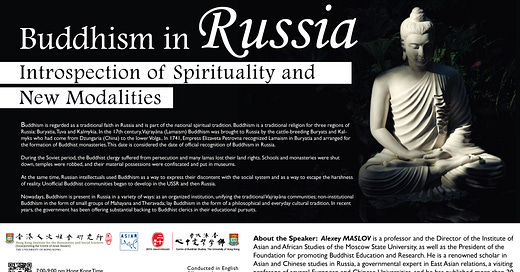About the Speaker
Alexey MASLOV is a professor and the Director of the Institute of Asian and African Studies of the Moscow State University, as well as the President of the Foundation for promoting Buddhist Education and Research. He is a renowned scholar in Asian and Chinese studies in Russia, a governmental expert in East Asian relations, a visiting professor of several European and Chinese Universities, and he has published more than 20 books, including translations of Buddhist scriptures.
Buddhism in Russia: Introspection of Spirituality and New Modalities
Buddhism is regarded as a traditional faith in Russia and is part of the national spiritual tradition. Buddhism is a traditional religion for three regions of Russia: Buryatia, Tuva and Kalmykia. In the 17th century, Vajrayāna (Lamaism) Buddhism was brought to Russia by the cattle-breeding Buryats and Kalmyks who had come from Dzungaria (China) to the lower Volga. In 1741, Empress Elizaveta Petrovna recognized Lamaism in Buryatia and arranged for the formation of Buddhist monasteries. This date is considered the date of official recognition of Buddhism in Russia.
During the Soviet period, the Buddhist clergy suffered from persecution and many lamas lost their land rights. Schools and monasteries were shut down, temples were robbed, and their material possessions were confiscated and put in museums.
At the same time, Russian intellectuals used Buddhism as a way to express their discontent with the social system and as a way to escape the harshness of reality. Unofficial Buddhist communities began to develop in the USSR and then Russia. Nowadays, Buddhism is present in Russia in a variety of ways: as an organized institution, unifying the traditional Vajrayāna communities; non-institutional Buddhism in the form of small groups of Mahayana and Theravada; lay Buddhism in the form of a philosophical and everyday cultural tradition. In recent years, the government has been offering substantial backing to Buddhist clerics in their educational pursuits.
Date: April 18, 2023 (Tuesday)
Time: 7:00-9:00 pm (HKT)
Venue: G/F Lecture Hall, May Hall, HKU & via ZOOM (Registration is required.)
Event website: Buddhism in Russia: Introspection of Spirituality and New Modalities
Buddhism in Russia: Introspection of Spirituality and New Modalities
We will look at the primary Buddhist studies conducted in Russia in various periods. Since the 20-30s of the 19th century, Buddhist studies in Russia have been marked by a fascination with the philosophical, moral, aesthetic and cultural elements of Buddhism. Various studies were based on translations of scarce texts from the Tibetan and Mongolian languages. Russia's vigorous involvement in Asia, particularly in China and Mongolia, caused the formation of many Buddhist libraries in Russia and the establishment of this generation of academics making up a one-of-a-kind Russian school of Buddhology, including academicians Vasily Vasiliev, Ivan Minaev, Sergey Oldenburg, Fedor Shcherbatskoy. Nevertheless, in the 1930s of the 20th centuriry many academic institutions were shut down and several top Buddhist scholars were arrested. Modern times are defined by research within the original Buddhist communities of Russia - Kalmyks, Buryats and Tuvans. Though there is some conflict between how academic and religious groups research are approached to The Buddhist studies, they are still striving for harmony.
Date: April 19, 2023 (Wednesday)
Time: 6:30-8:30 pm (HKT)
Venue: CBC, LG1/F, Chow Yei Ching Building, HKU (Registration is required.)
Event website: Buddhist Studies in Russia: Academic Traditions and New Research
Organizers
•ASIAR Research Cluster, HKIHSS, under the CRF Project “Infrastructures of Faith: Religious Mobilities on the Belt and Road [BRINFAITH]” (RGC CRF HKU C7052-18G)
•HKU Centre of Buddhist Studies





